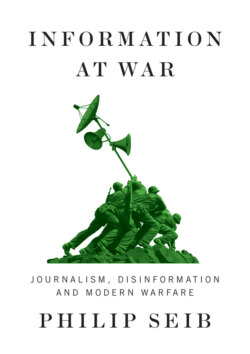Читать книгу Information at War - Philip Seib - Страница 14
Notes
Оглавление1 1 For additional material about wartime information’s effects, see (among others) Stuart Allan and Barbie Zelizer, Reporting War: Journalism in Wartime (London: Routledge, 2004).
2 2 See Ronald D. Asmus, “Power, War, and Public Opinion,” Hoover Institution Policy Review, February/March 2004, www.hoover.org/research/power-war-and-public-opinion; Philip Seib (ed.), War and Conflict Communication (London: Routledge, 2010), 171–305.
3 3 Philip Seib, The Global Journalist: News and Conscience in a World of Conflict (Lanham, MD: Rowman and Littlefield, 2002), 121.
4 4 Quoted in Piers Brandon, The Dark Valley (New York: Knopf, 2000), 624.
5 5 Philip Ziegler, London at War, 1939–1945 (London: Pimlico, 2002), 126, 154.
6 6 Edward R. Murrow, This Is London (New York: Simon & Schuster, 1941), 161, 163. See also Philip Seib, Broadcasts from the Blitz: How Edward R. Murrow Helped Lead America into War (Dulles, VA: Potomac Books, 2006).
7 7 Murrow, This Is London, 163.
8 8 Murrow, This Is London, 167, 169–70.
9 9 Murrow, This Is London, 172, 173, 178.
10 10 Murrow, This Is London, 180, 182.
11 11 Robert E. Sherwood, Roosevelt and Hopkins (New York: Enigma, 2001), 170.
12 12 Susan Dunn, A Blueprint for War: FDR and the Hundred Days that Mobilized America (New Haven: Yale University Press, 2018), 8–9.
13 13 Cloud and Olson, The Murrow Boys, 97.
14 14 Robert Dallek, Franklin D. Roosevelt and American Foreign Policy 1932–1945 (New York: Oxford University Press, 1979), 250.
15 15 Hadley Cantril, “Public Opinion in Flux,” Annals of the American Academy of Political and Social Science 220 (March 1942), 138, 146.
16 16 Cantril, “Public Opinion in Flux,” 144, 145.
17 17 Cantril, “Public Opinion in Flux,” 141, 147, 150.
18 18 Cantril, “Public Opinion in Flux,” 138.
19 19 A. M. Sperber, Murrow: His Life and Times (New York: Freundlich Books, 1986), 174.
20 20 Jon Meacham, Franklin and Winston (New York: Random House, 2003), 52.
21 21 Nicholas John Cull, Selling War: The British Propaganda Campaign against American “Neutrality” in World War II (New York: Oxford University Press, 1995), 157–8.
22 22 Meacham, Franklin and Winston, 75.
23 23 Paul W. White, News on the Air (New York: Harcourt Brace, 1947), 31.
24 24 See Eytan Gilboa, “The CNN Effect: The Search for a Communication Theory of International Relations,” Political Communication 22 (2005), 27–44.
25 25 www.fdrlibrary.marist.edu/_resources/images/msf/msf01403.
26 26 Eric Sevareid, Not So Wild a Dream (New York: Atheneum, 1976), 178.
27 27 Murrow, This Is London, 150, 152, 158–9.
28 28 Edward R. Murrow, “A Report to America,” in “In Honor of a Man and an Ideal: Three Talks on Freedom,” CBS, December 2, 1941, 31.
29 29 Archibald MacLeish, “A Superstition Is Destroyed,” in “In Honor of a Man and an Ideal: Three Talks on Freedom,” CBS, December 2, 1941, 6, 7.
30 30 Stanley Karnow, Vietnam: A History (New York: Penguin, 1991), 526–7.
31 31 Clark Clifford, Counsel to the President (New York: Random House, 1991), 474.
32 32 Turner Catledge, My Life and The Times (New York: Harper & Row, 1971), 264. See also Seib, Headline Diplomacy, 74.
33 33 Max Frankel, High Noon in the Cold War: Kennedy, Khrushchev, and the Cuban Missile Crisis (New York: Presidio Press, 2004), 105.
34 34 www.archives.gov/publications/prologue/2002/fall/cuban-missiles.html.
35 35 Graham Allison, “The Cuban Missile Crisis at 50,” Foreign Affairs 91, no. 4 (July/August 2012), 16.
36 36 Quoted in Prochnau, Once Upon a Distant War, 220.
37 37 Prochnau, Once Upon a Distant War, 143.
38 38 Prochnau, Once Upon a Distant War, 378.
39 39 See Prochnau, Once Upon a Distant War.
40 40 Quoted in Richard Reeves, President Kennedy: Profile of Power (New York: Simon & Schuster, 1993), 636–7.
41 41 Prochnau, Once Upon a Distant War, 454.
42 42 Quoted in Prochnau, Once Upon a Distant War, 405.
43 43 Richard Harwood and Haynes Johnson, Lyndon (New York: Praeger, 1973), 122–3.
44 44 Reeves, President Kennedy, 282.
45 45 Benjamin C. Bradlee, Conversations with Kennedy (New York: W. W. Norton, 1975), 58.
46 46 www.americanwarlibrary.com/vietnam/vwatl.htm.
47 47 www.vvmf.org/wall-facts.
48 48 See Guenter Lewy, America in Vietnam (New York: Oxford University Press, 1978), 442–53.
49 49 Michael J. Arlen, Living-Room War (New York: Viking, 1969), 7.
50 50 Arlen, Living-Room War, 83.
51 51 Arlen, Living-Room War, 81–2.
52 52 James H. Willbanks, The Tet Offensive (New York: Columbia University Press, 2007), 30.
53 53 Clifford, Counsel to the President, 479.
54 54 Peter Arnett, Live from the Battlefield (New York: Simon & Schuster, 1994), 256.
55 55 Herbert Y. Schandler, The Unmaking of a President (Princeton University Press, 1977), 81.
56 56 Arnett, Live from the Battlefield, 257.
57 57 Daniel Hallin, The “Uncensored War”: The Media and Vietnam (Berkeley: University of California Press, 1989), 173.
58 58 Hallin, The “Uncensored War,” 53.
59 59 Don Oberdorfer, Tet (New York: Avon, 1971), 264.
60 60 www.npr.org/templates/story/story.php?storyId=106775685.
61 61 Quoted in Townsend Hoopes, The Limits of Intervention (New York: David McKay Co., 1969), 140.
62 62 Hoopes, The Limits of Intervention, 156.
63 63 www.pewresearch.org/fact-tank/2013/11/22/50-years-ago-america-turned-on-the-television.
64 64 Quoted in Austin Ranney, Channels of Power (New York: Basic Books, 1983), 134.
65 65 Quoted in Schandler, The Unmaking of a President, 198.
66 66 Braestrup, Big Story, 508.
67 67 Braestrup, Big Story, 468.
68 68 Quoted in John Lewis Gaddis, George F. Kennan: An American Life (New York: Penguin, 2011), 593.
